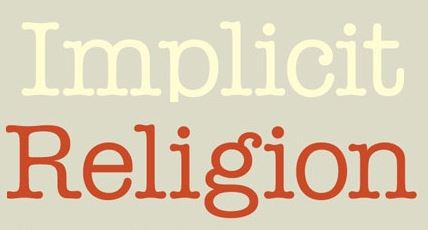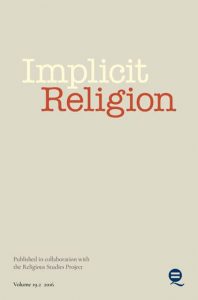
Dr. David Robertson is Co-Editor of the journal Implicit Religion and co-editor and founding editor of The Religious Studies Project.
If, like me, you use the kind of critical approach that Russell McCutcheon was talking about in his recent post, focusing on processes of designation, then you’ll sooner or later be told by a colleague that you waste time endlessly arguing about definitions. Often this is followed up by the claim that they “don’t do theory.” I’ve even had people exasperatedly tell me that none of what I do matters to real people, on the ground.
Of course, you can’t not do theory – but you can be conscious of it, or not. As Rush said, “If you choose not to decide, you still have made a choice.” You’ve chosen the implicit folk category, inherited from colonialism and Protestantism – that religion is a special thing, set apart and unique, beliefs about ‘big questions’, of inherent value to people.
(As an aside, it’s interesting how many of those arguing that we can find religion in overlooked places present this as intrinsically a good thing. For those who focus on identifying new forms of spirituality, or religion in new places, the churches may be in decline, but the Nones/SBNRs still have values, beliefs, rituals… We saw the same thing in the early days of the study of religion where Protestant theologians strove to establish a grounding for Christianity outside of the Church and apart from the mythology of the Bible. Their arguments that religion is all about how people themselves relate to the spiritual, it’s just those elitist priests corrupting things, is exactly what most material or lived or implicit religion scholars are arguing.)
There is nothing new about this split in the field between those who see our field as analyzing social processes and those who see it as about being better humans, as Leonardo Ambasciano’s recent book demonstrates most clearly. Although we tend to think of this as a split between Religious Studies and Theology, perhaps, as Russell McCutcheon recently tweeted, this is better framed as a split between those who approach religion as a social science and those using a humanities approach:
For quite some time I’ve not been a fan of the theology vs rel st framing of the debate. For me it’s more about humanistic vs social scientific approaches. References to the enduring human spirit just as troublesome as souls.
— Russell McCutcheon (@McCutcheonSays) February 26, 2019
But what is certainly true is that the critical/discursive/attributional study of religion needs to better articulate the utility of the approach, in contexts beyond academic debates on method and theory. The fact is that what gets counted as religion in specific contexts is perhaps the most impactful question we can ask as social scientists. Far from being merely discourse-about-discourse in some Ivory Tower, the critical approach shows what the category is actually doing in the real world – both to those whom it constrains, and those for whom it is useful.
The Religious Studies Project has been making resources for the classroom that do this since 2012, and the University of Alabama and The Open University are showing what the post-World Religions department might look like. But we could do more.
 Confession time: when I took over as editor of Implicit Religion with Jack Laughlin, I had no interest in implicit religion as a theoretical framework. Rather, my interest was, and is, in what assumptions are implicit when someone identifies something as religious – be that in the media, the law, healthcare, academia, or whatever. While the excellent journal Method & Theory in the Study of Religion focuses programmatically on this approach, I want Implicit Religion to complement this with articles and themed issues on how these processes play out in the world, especially on the ragged edges of the category.
Confession time: when I took over as editor of Implicit Religion with Jack Laughlin, I had no interest in implicit religion as a theoretical framework. Rather, my interest was, and is, in what assumptions are implicit when someone identifies something as religious – be that in the media, the law, healthcare, academia, or whatever. While the excellent journal Method & Theory in the Study of Religion focuses programmatically on this approach, I want Implicit Religion to complement this with articles and themed issues on how these processes play out in the world, especially on the ragged edges of the category.
 You know… real people, on the ground. For example, when whether having a Christmas Tree was a civil or religious duty became a serious public issue in Denmark. Or when a judge ruled that nationalism was “religion-like”, so a man kept his job — but other times, allows us to take religion off the table when it would mean that it was implicated in violence or bigotry. Tying state ceremonies to religious institutions makes it harder to challenge either of them. Classifying “mindfulness” as secular means that it can better serve neoliberalism.
You know… real people, on the ground. For example, when whether having a Christmas Tree was a civil or religious duty became a serious public issue in Denmark. Or when a judge ruled that nationalism was “religion-like”, so a man kept his job — but other times, allows us to take religion off the table when it would mean that it was implicated in violence or bigotry. Tying state ceremonies to religious institutions makes it harder to challenge either of them. Classifying “mindfulness” as secular means that it can better serve neoliberalism.
And these are just a few examples. I’m sure you can think of any more — and we’re looking for submissions…
Hi
Just a note to say thanks for this and your blog that got me here. My latest project was in need of a spark. Your work is appreciated.
Daryl Carlson